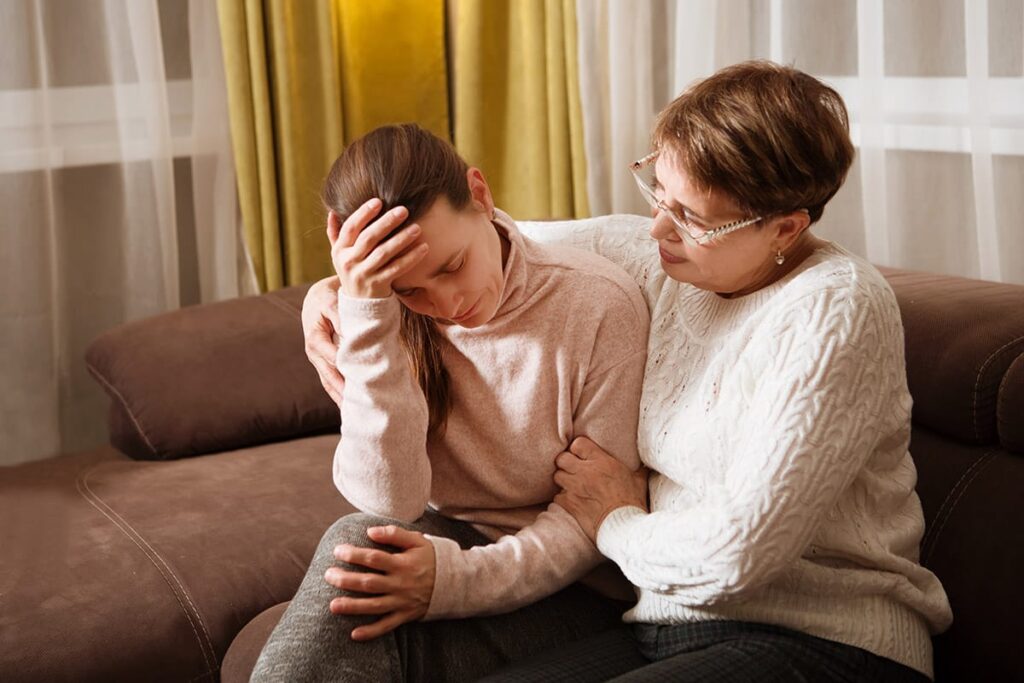Millions of Americans struggle with addiction each year, but only a few get the help they need to recover. If your adult child is dealing with a substance use disorder, helping them seek treatment is one of the most important things you can do. Vertava Health has several treatment facilities throughout the country that cater to each patient’s unique needs and help them overcome addiction and reclaim their life in sobriety. Contact us at 844.470.0410 today to learn about our addiction treatment centers. We can guide how to help an adult child addicted to drugs or alcohol.
Are You Enabling Your Addicted Adult Child?
Having a loved one who is struggling with addiction can be challenging. When that loved one is an adult child, it can be even more difficult to cope and know what to do. As parents, individuals often want to protect and shield their children from harm and pain. Many parents feel the urge to “fix” things for their children. While helping an adult child suffering from a substance use disorder may seem like the right thing to do, there are many wrong ways to go about it. Some parents enable their adult children through certain behaviors. This ends up hurting them more than helping them. Enabling a person addicted to drugs or alcohol only fuels the cycle. Examples of enabling behavior may include:
- Trying to “save” an adult child every time they are in trouble or need help
- Giving an adult child money that may be used to buy more drugs or alcohol
- Continuing to financially support an adult child when they have lost a job or are unable to pay bills due to addiction
- Ignoring or making excuses for harmful behavior
- Lying to cover up the adult child’s addiction and negative behaviors
- Fulfilling commitments or other responsibilities that the adult child has
- Bailing an adult child out of jail or other situations that arose as a result of alcohol or drug use
Acting in the ways mentioned above is the right thing to do at the time. Unfortunately, enabling behavior only contributes to the problem and can encourage destructive behavior. By allowing your adult child, you are essentially communicating that you will support their addictive behavior and will continue to take care of the consequences for the adult child.
How To Help Your Adult Child Who is Addicted to Drugs or Alcohol
You can do several things to help an adult child who is addicted to drugs or alcohol. If you are currently acting in ways that enable addictive behaviors, learning how to cope healthily and setting clear boundaries with your adult child should be a priority. Only when you extricate yourself from your child’s destructive behaviors and set boundaries will you be able to begin to help them effectively. Once clear boundaries have been set, there are actions you can begin to take to help your adult child in their struggle with addiction. These actions may include:
- Eliminate enabling behaviors — As mentioned earlier, enabling behaviors can seriously impact an adult child’s addiction. Continuing to enable an adult child can prolong their addiction and continue the cycle of use and dependence. Committing to eliminating enabling behaviors may be difficult but can be very helpful in encouraging an adult child to seek help for an addiction.
- Acknowledge that your child is an adult — Some adult children may blame their parents for their addiction or other destructive behaviors. While this may be hurtful as a parent, it’s important to understand that your child is an adult and holds all the power regarding their decisions and lifestyle. Acknowledging that your child is an adult and refusing to take the blame for their choices can encourage your child to take responsibility for their life.
- Confront your adult child about their addiction — Confronting someone about their addiction is never easy. However, continuing to look the other way as an adult child lives in active addiction can be harmful and prolong the addictive cycle. Confronting your child in an open and understanding way about their addiction, like with drug intervention, can be helpful in helping them take responsibility.
- Attend support groups — There are several resources for parents of adult children addicted to drugs or alcohol. One of the most popular support groups is Al-Anon. Attending these types of programs can help you better understand your child’s behaviors and learn coping skills to help you take care of yourself while also helping your adult child recover.
In addition to these actions, staging an intervention may also be useful in helping your adult child get the help they need and deserve. An intervention may consist of family members and close friends directly impacted by the person’s addiction coming together to share their thoughts and feelings on the person’s addiction. Staging an intervention is an excellent way to introduce the idea of treatment and let your child know that you will support them throughout the recovery process.
Helping an Adult Child with Substance Use at Vertava Health
Having a loved one addicted to drugs or alcohol is never easy. However, by taking the steps mentioned above, you can help your child realize that they need help. There are several treatment options to consider with your child, including the addiction programs offered at the various Vertava Health treatment facilities. To learn more about how you can help your adult child who is struggling with addiction, contact a Vertava Health treatment specialist today at 844.470.0410. We are here to help.


